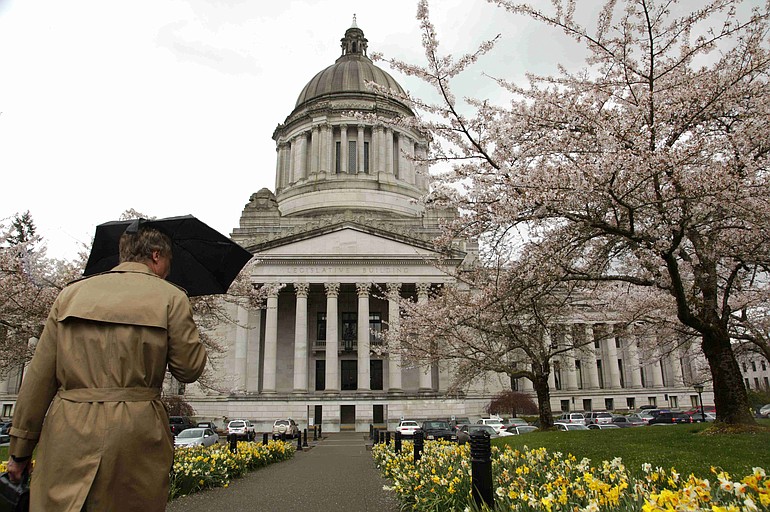Local lawmakers used their influence this year
It’s May Day. The state Capitol grounds are in bloom. And lawmakers are back in Olympia, slugging it out over the budget.
The key item on their to-do list — enacting a plan to fund state government for the next two years — remains a work in progress.
Gov. Chris Gregoire called the Legislature into special session beginning last Tuesday for up to 30 days. Scores of bills deemed “necessary to implement the budget” stand between legislators and passage of a budget that will let them go home.
The heaviest lifting still lies ahead, not only on how to bridge a gap of more than $5 billion between projected spending and available revenue, but also on whether to overhaul the state workers’ compensation system, reduce the state’s debt limit, privatize wholesale liquor distribution, and cut teacher pay.
Lawmakers also will decide whether to submit a measure to voters in November that would eliminate some tax breaks, including the sales tax exemption for out-of-state residents. Some Vancouver businesses say that would cripple their ability to attract Oregon customers.
The tumultuous 103-day regular session ended two days ahead of schedule on April 22. It was marked by protests from labor unions and advocates for children, the poor and the disabled over proposed deep cuts to education and social services programs. Regardless of how the final budget balances revenue and spending, virtually all of those programs will take major hits.
So will college students, who face steep increases in tuition for the third and fourth years in a row. Just last Tuesday, students at Washington State University Vancouver held a rally and protest over “staggering” tuition hikes, freezes and cuts in faculty pay, and what they regard as a lack of student and faculty representation in higher education budget decisions.
But the regular session did produce some significant new laws, along with a bill permitting beer and wine tastings at farmers markets.
“We passed major improvements to the unemployment insurance system, proposed massive reforms to the worker’s compensation program, and are still working to finalize other major government reform initiatives,” said Sen. Craig Pridemore, D-Vancouver.
As of Friday, the Legislature had delivered more than 200 bills to the governor’s desk and Gregoire had signed nearly all of them into law. Under special session rules, hundreds more that didn’t make it out of the regular session could be revived, though budget leaders said they intend to stay focused on bills needed to pass the budget.
One of the first and most urgent bills to clear the governor’s desk was a measure to cut the unemployment insurance rate paid by businesses. Gregoire had warned that unless lawmakers delivered the bill by Feb. 8, businesses still struggling to emerge from the recession could see their unemployment taxes jump by an average of 36 percent. The $300 million measure also temporarily bumped jobless benefits by $25 a week for people who enroll in the program between March and November of this year.
Here’s a rundown of what else the 2011 session has accomplished so far:
Education
Big decisions on how the state will fulfill its constitutionally “paramount duty” to fund K-12 education are yet to be made. However, lawmakers passed and sent to the governor policy measures that will encourage states to teach the history of the nation’s civil rights movement; establish the state’s first nonprofit online university; require all high schools to work toward offering enough dual-credit courses to let students earn the equivalent of one year’s college credits before graduation; and allow students in the 2013 and 2014 graduating classes to meet the state’s math graduation standard by passing one end-of-course test instead of two.
Health
The state’s Basic Health program for the working poor has eliminated tens of thousands of slots over the past two years, and its budget is sure to be slashed further. Children of undocumented immigrants may lose their state-subsidized coverage. Those cuts are occurring even as Washington takes the initial steps to implement the federal Affordable Care Act by establishing a health care exchange.
However, health committees in the House and Senate approved a number of health policy bills, including measures that would bring greater transparency to the disciplinary process for health professionals and regulate the administration of drugs by nonprofessional health care assistants.
Social services
Though social services will sustain huge cuts in the budget, the Legislature passed several policy bills, many sponsored by state Rep. Jim Moeller, D-Vancouver, to protect vulnerable Washington citizens. Among them are measures that establish standards to make sure senior citizens are referred to programs that provide appropriate services; provide guardians with free training; and allow boarding homes to expand the services they offer when people are making the transition from a nursing home to a private home.
On the consumer protection front, lawmakers passed a bill that expands protections and education for homeowners facing foreclosure.
And in the area of criminal justice, they passed a bill that expands the makeup of statewide panels that review domestic violence fatalities to include teachers and school guidance counselors and another that strengthens child fatality reviews in child welfare cases.



